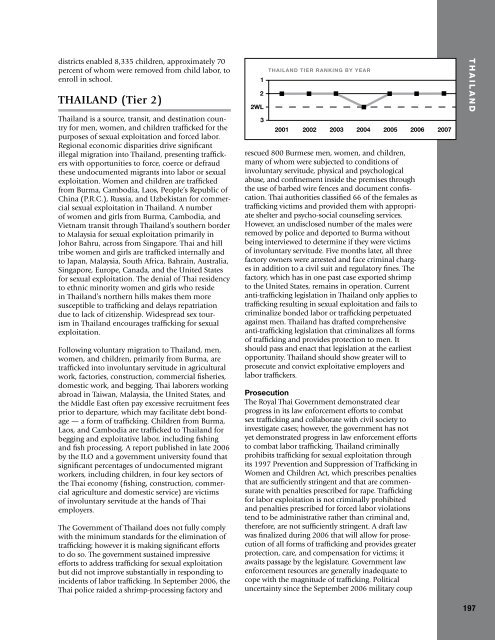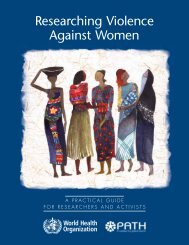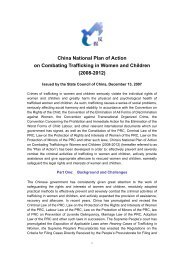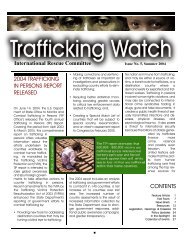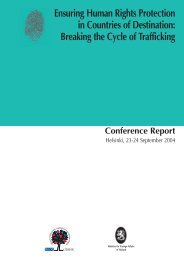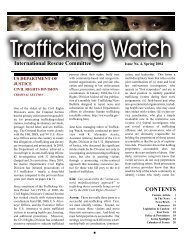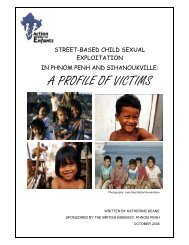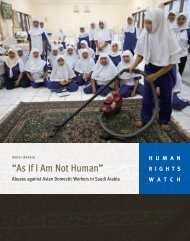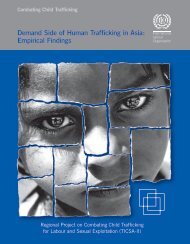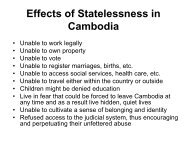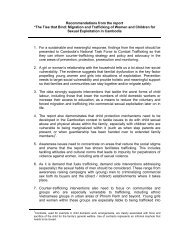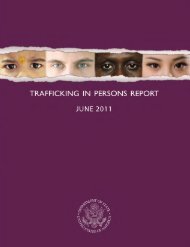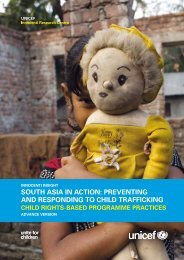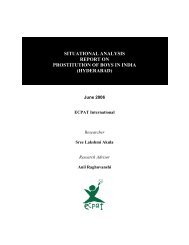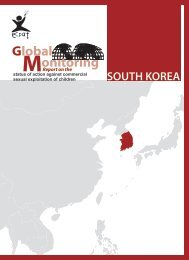2007 Trafficking in Persons Report - Center for Women Policy Studies
2007 Trafficking in Persons Report - Center for Women Policy Studies
2007 Trafficking in Persons Report - Center for Women Policy Studies
You also want an ePaper? Increase the reach of your titles
YUMPU automatically turns print PDFs into web optimized ePapers that Google loves.
districts enabled 8,335 children, approximately 70<br />
percent of whom were removed from child labor, to<br />
enroll <strong>in</strong> school.<br />
THAILAND (Tier 2)<br />
Thailand is a source, transit, and dest<strong>in</strong>ation country<br />
<strong>for</strong> men, women, and children trafficked <strong>for</strong> the<br />
purposes of sexual exploitation and <strong>for</strong>ced labor.<br />
Regional economic disparities drive significant<br />
illegal migration <strong>in</strong>to Thailand, present<strong>in</strong>g traffickers<br />
with opportunities to <strong>for</strong>ce, coerce or defraud<br />
these undocumented migrants <strong>in</strong>to labor or sexual<br />
exploitation. <strong>Women</strong> and children are trafficked<br />
from Burma, Cambodia, Laos, People’s Republic of<br />
Ch<strong>in</strong>a (P.R.C.), Russia, and Uzbekistan <strong>for</strong> commercial<br />
sexual exploitation <strong>in</strong> Thailand. A number<br />
of women and girls from Burma, Cambodia, and<br />
Vietnam transit through Thailand’s southern border<br />
to Malaysia <strong>for</strong> sexual exploitation primarily <strong>in</strong><br />
Johor Bahru, across from S<strong>in</strong>gapore. Thai and hill<br />
tribe women and girls are trafficked <strong>in</strong>ternally and<br />
to Japan, Malaysia, South Africa, Bahra<strong>in</strong>, Australia,<br />
S<strong>in</strong>gapore, Europe, Canada, and the United States<br />
<strong>for</strong> sexual exploitation. The denial of Thai residency<br />
to ethnic m<strong>in</strong>ority women and girls who reside<br />
<strong>in</strong> Thailand’s northern hills makes them more<br />
susceptible to traffick<strong>in</strong>g and delays repatriation<br />
due to lack of citizenship. Widespread sex tourism<br />
<strong>in</strong> Thailand encourages traffick<strong>in</strong>g <strong>for</strong> sexual<br />
exploitation.<br />
Follow<strong>in</strong>g voluntary migration to Thailand, men,<br />
women, and children, primarily from Burma, are<br />
trafficked <strong>in</strong>to <strong>in</strong>voluntary servitude <strong>in</strong> agricultural<br />
work, factories, construction, commercial fisheries,<br />
domestic work, and begg<strong>in</strong>g. Thai laborers work<strong>in</strong>g<br />
abroad <strong>in</strong> Taiwan, Malaysia, the United States, and<br />
the Middle East often pay excessive recruitment fees<br />
prior to departure, which may facilitate debt bondage<br />
— a <strong>for</strong>m of traffick<strong>in</strong>g. Children from Burma,<br />
Laos, and Cambodia are trafficked to Thailand <strong>for</strong><br />
begg<strong>in</strong>g and exploitative labor, <strong>in</strong>clud<strong>in</strong>g fish<strong>in</strong>g<br />
and fish process<strong>in</strong>g. A report published <strong>in</strong> late 2006<br />
by the ILO and a government university found that<br />
significant percentages of undocumented migrant<br />
workers, <strong>in</strong>clud<strong>in</strong>g children, <strong>in</strong> four key sectors of<br />
the Thai economy (fish<strong>in</strong>g, construction, commercial<br />
agriculture and domestic service) are victims<br />
of <strong>in</strong>voluntary servitude at the hands of Thai<br />
employers.<br />
The Government of Thailand does not fully comply<br />
with the m<strong>in</strong>imum standards <strong>for</strong> the elim<strong>in</strong>ation of<br />
traffick<strong>in</strong>g; however it is mak<strong>in</strong>g significant ef<strong>for</strong>ts<br />
to do so. The government susta<strong>in</strong>ed impressive<br />
ef<strong>for</strong>ts to address traffick<strong>in</strong>g <strong>for</strong> sexual exploitation<br />
but did not improve substantially <strong>in</strong> respond<strong>in</strong>g to<br />
<strong>in</strong>cidents of labor traffick<strong>in</strong>g. In September 2006, the<br />
Thai police raided a shrimp-process<strong>in</strong>g factory and<br />
rescued 800 Burmese men, women, and children,<br />
many of whom were subjected to conditions of<br />
<strong>in</strong>voluntary servitude, physical and psychological<br />
abuse, and conf<strong>in</strong>ement <strong>in</strong>side the premises through<br />
the use of barbed wire fences and document confiscation.<br />
Thai authorities classified 66 of the females as<br />
traffick<strong>in</strong>g victims and provided them with appropriate<br />
shelter and psycho-social counsel<strong>in</strong>g services.<br />
However, an undisclosed number of the males were<br />
removed by police and deported to Burma without<br />
be<strong>in</strong>g <strong>in</strong>terviewed to determ<strong>in</strong>e if they were victims<br />
of <strong>in</strong>voluntary servitude. Five months later, all three<br />
factory owners were arrested and face crim<strong>in</strong>al charges<br />
<strong>in</strong> addition to a civil suit and regulatory f<strong>in</strong>es. The<br />
factory, which has <strong>in</strong> one past case exported shrimp<br />
to the United States, rema<strong>in</strong>s <strong>in</strong> operation. Current<br />
anti-traffick<strong>in</strong>g legislation <strong>in</strong> Thailand only applies to<br />
traffick<strong>in</strong>g result<strong>in</strong>g <strong>in</strong> sexual exploitation and fails to<br />
crim<strong>in</strong>alize bonded labor or traffick<strong>in</strong>g perpetuated<br />
aga<strong>in</strong>st men. Thailand has drafted comprehensive<br />
anti-traffick<strong>in</strong>g legislation that crim<strong>in</strong>alizes all <strong>for</strong>ms<br />
of traffick<strong>in</strong>g and provides protection to men. It<br />
should pass and enact that legislation at the earliest<br />
opportunity. Thailand should show greater will to<br />
prosecute and convict exploitative employers and<br />
labor traffickers.<br />
Prosecution<br />
The Royal Thai Government demonstrated clear<br />
progress <strong>in</strong> its law en<strong>for</strong>cement ef<strong>for</strong>ts to combat<br />
sex traffick<strong>in</strong>g and collaborate with civil society to<br />
<strong>in</strong>vestigate cases; however, the government has not<br />
yet demonstrated progress <strong>in</strong> law en<strong>for</strong>cement ef<strong>for</strong>ts<br />
to combat labor traffick<strong>in</strong>g. Thailand crim<strong>in</strong>ally<br />
prohibits traffick<strong>in</strong>g <strong>for</strong> sexual exploitation through<br />
its 1997 Prevention and Suppression of <strong>Traffick<strong>in</strong>g</strong> <strong>in</strong><br />
<strong>Women</strong> and Children Act, which prescribes penalties<br />
that are sufficiently str<strong>in</strong>gent and that are commensurate<br />
with penalties prescribed <strong>for</strong> rape. <strong>Traffick<strong>in</strong>g</strong><br />
<strong>for</strong> labor exploitation is not crim<strong>in</strong>ally prohibited<br />
and penalties prescribed <strong>for</strong> <strong>for</strong>ced labor violations<br />
tend to be adm<strong>in</strong>istrative rather than crim<strong>in</strong>al and,<br />
there<strong>for</strong>e, are not sufficiently str<strong>in</strong>gent. A draft law<br />
was f<strong>in</strong>alized dur<strong>in</strong>g 2006 that will allow <strong>for</strong> prosecution<br />
of all <strong>for</strong>ms of traffick<strong>in</strong>g and provides greater<br />
protection, care, and compensation <strong>for</strong> victims; it<br />
awaits passage by the legislature. Government law<br />
en<strong>for</strong>cement resources are generally <strong>in</strong>adequate to<br />
cope with the magnitude of traffick<strong>in</strong>g. Political<br />
uncerta<strong>in</strong>ty s<strong>in</strong>ce the September 2006 military coup<br />
T H A I L A N D<br />
197


